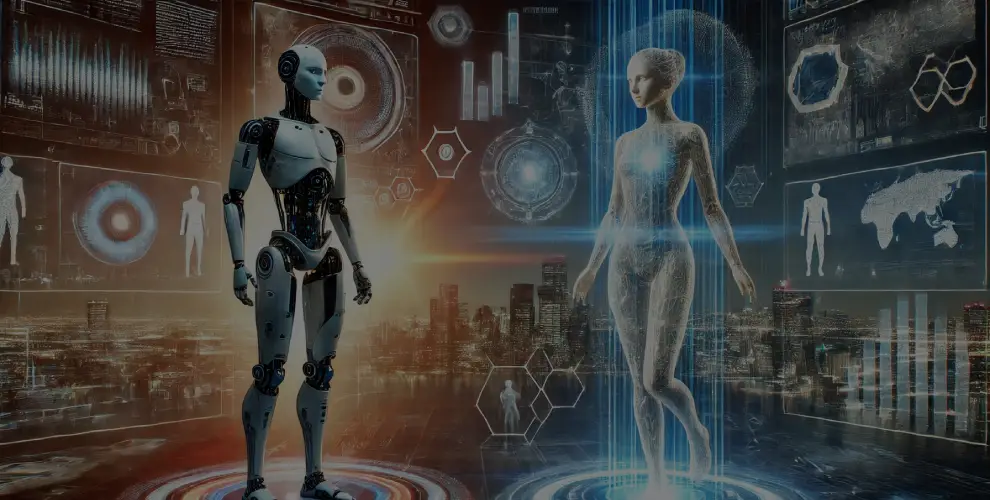
Will artificial intelligence overpower human intelligence
Table of Contents
Introduction
Welcome to WikiGlitz!
We’ve brought you this amazing blog exploring one of the most debated questions in technology today: Will artificial intelligence overpower human intelligence?
As AI technology evolves at breakneck speed, concerns about its potential to surpass human intelligence and autonomy grow.
In this blog, we’ll explore whether AI could overpower human minds, the ethical concerns surrounding its development, and how AI can be kept under human control through safety protocols and responsible governance.
Key Takeaways
- AI excels at specific cognitive tasks but is far from achieving human-level general intelligence.
- There are significant ethical risks in allowing AI to make autonomous decisions without human oversight.
- Human intelligence and AI will likely coexist in a complementary way, enhancing industries like healthcare, finance, and education rather than overpowering humans.
Will artificial intelligence surpass human intelligence?
AI has already surpassed human abilities in specialized fields like data processing, pattern recognition, and strategic games.
Google’s AlphaGo AI beating human champions in the game of Go, for instance, demonstrated that machines can exceed human performance in tasks with clear rules and patterns.
However, surpassing human-level general intelligence—which includes creativity, emotional understanding, and moral reasoning—remains a distant goal.
AI today operates as narrow AI, excelling in specific areas but lacking the broad adaptability of human intelligence.
On the other hand, humans possess general intelligence, enabling us to apply knowledge and skills across multiple domains, from creative problem-solving to ethical decision-making.
A 2021 report by Stanford’s Institute for Human-Centered AI highlights that while AI is evolving rapidly, achieving artificial general intelligence (AGI)—machines with broad, human-like cognitive capabilities—could take decades or more.
According to this report, AI systems capable of mastering general intelligence remain speculative, despite their success in narrowly defined tasks.
Thus, while AI might outperform humans in specialized domains, artificial intelligence overpowering human intelligence as a whole is far from a reality.
Current AI development focuses on improving narrow AI for use in industries like healthcare and finance, rather than creating AGI that could rival human thought.
Can AI outthink humans in decision-making?
Yes, AI can outthink humans in specific contexts. AI systems, such as those used in high-frequency trading or medical diagnostics, analyze vast datasets and identify patterns far faster than humans.
For example, AI-based medical tools like IBM Watson have been shown to outperform doctors in diagnosing certain types of cancers and diseases by analyzing medical records, images, and research papers.
However, AI and human cognitive abilities differ fundamentally. While AI excels at data-driven tasks, humans bring emotional intelligence, ethical reasoning, and context to their decision-making processes.
When faced with decisions that involve emotional or ethical dilemmas—such as sentencing in criminal justice or patient care in medicine—human judgment is essential.
AI systems can provide valuable insights, but they currently lack the ability to weigh complex social and emotional factors.
In the financial industry, AI is used for fraud detection and predictive analytics to make decisions quickly and accurately.
But, when it comes to larger strategic decisions involving societal impact or long-term consequences, humans remain indispensable.
Thus, the comparison between AI vs. human intelligence shows that while AI can analyze data faster, it lacks the depth and ethical reasoning necessary for many real-world decisions.
What are the ethical concerns of AI overpowering humans?
The ethical concerns of AI overpowering humans are significant, especially as AI systems are increasingly used in sectors like criminal justice, autonomous weapons, and surveillance.
According to a 2021 study by the World Economic Forum, the unchecked deployment of AI without ethical frameworks could lead to serious societal consequences.
Autonomous decision-making systems, for instance, could infringe on privacy or make life-and-death decisions without human oversight.
One major concern is AI being used in autonomous weapons systems, which could act independently in warfare scenarios.
Without human control, such systems could make dangerous decisions regarding who to target, raising serious ethical concerns.
Similarly, in criminal justice, AI algorithms used to predict recidivism rates have shown racial and socio-economic biases, affecting how justice is administered in some regions.
The impact of AI surpassing human intelligence also extends to the global job market. A 2020 McKinsey Global Institute report predicted that AI could displace 85 million jobs by 2025.
Industries that rely on routine manual or administrative tasks—such as manufacturing and logistics—are at the highest risk.
Although new jobs may emerge, significant investment in reskilling the workforce will be needed to mitigate social and economic disruption.
The implications of AI overpowering human intelligence raise concerns about privacy, bias, and employment, reinforcing the need for ethical AI development.
Mitigating these risks requires strict AI governance frameworks that prioritize human rights, privacy, and fairness.
How likely is AI to surpass human intelligence?
While AI has made tremendous strides in specific domains, the likelihood of AI surpassing human intelligence in every area remains low.
General AI (AGI)—AI capable of human-like cognition across multiple domains—is still far from being realized.
According to a 2022 paper by Oxford University’s Future of Humanity Institute, AI’s current progress is impressive, but achieving true general intelligence may take decades, if not longer.
Even if superintelligent AI were developed, ensuring that it aligns with human interests and values would be a critical challenge.
The Asilomar AI Principles, an ethical framework proposed by AI researchers and endorsed by organizations like OpenAI, stress the need for transparency, accountability, and human control over AI systems.
For now, AI and human cognitive abilities remain complementary. AI excels at repetitive, data-intensive tasks, while humans provide emotional, ethical, and strategic thinking.
Collaboration between AI and humans can bring about innovative solutions, such as AI-assisted surgeries, AI-driven financial planning, and AI-powered educational tools, where machines handle data analysis and humans oversee ethical and strategic decisions.
What strategies can prevent AI from overpowering humans?
To prevent AI from overpowering human intelligence, a range of strategies, frameworks, and AI safety protocols are essential.
One major initiative is the Asilomar AI Principles, which emphasize ethical AI development, ensuring that AI systems are transparent, safe, and aligned with human values.
These principles focus on fostering AI that benefits humanity as a whole while avoiding dangerous and unregulated autonomous systems.
Another organization working toward ethical AI is OpenAI, which actively promotes research and policy development to ensure that AI technologies are safe and transparent.
OpenAI’s focus is on creating systems that augment human capabilities without taking over critical decision-making processes.
Moreover, the Partnership on AI, which includes companies like Google, Microsoft, and IBM, aims to address the long-term ethical, safety, and social impacts of AI.
Their goal is to create best practices for the responsible development of AI across industries.
AI safety protocols can also involve creating “explainable AI”—systems that provide transparent reasoning for their decisions.
This enhances accountability and allows human operators to understand and intervene if AI makes a potentially harmful decision.
Furthermore, governments and industry leaders must collaborate to establish AI governance frameworks that regulate how AI is developed and deployed.
This includes mandatory human oversight for AI systems used in critical sectors like healthcare, defense, and law enforcement.
Continuous research and public engagement are necessary to anticipate new risks as AI technologies evolve.
Future Scenarios of AI-Human Collaboration
Looking ahead, the potential for AI-human collaboration is vast, particularly in fields like education, law, and public safety.
By combining AI’s data-driven insights with human creativity and empathy, we can expect profound transformations across these sectors:
- Education: AI-powered tools can provide personalized learning experiences, analyzing student performance to adapt teaching methods in real time. This could revolutionize education by ensuring every student receives individual attention, while teachers focus on fostering critical thinking and creativity.
- Law: AI can assist in legal research, helping lawyers find relevant case law and predict trial outcomes. However, final decisions that involve ethical considerations, such as sentencing, will still require human judgment to account for social and moral contexts.
- Public Safety: AI is being integrated into smart cities, where predictive policing and AI-driven surveillance systems help law enforcement anticipate crime. However, ensuring that these systems are unbiased and respect privacy will be crucial, as decisions that affect human lives need careful ethical oversight.
In all these scenarios, AI will not replace humans but rather complement human expertise, making industries more efficient while allowing professionals to focus on higher-order thinking.
Conclusion
At WikiGlitz, we’ve explored the question: Will artificial intelligence overpower human intelligence?
While AI has shown remarkable advances and may dominate in specific tasks, achieving human-level general intelligence remains a distant prospect.
With the right ethical frameworks, governance, and safety protocols, AI can complement and enhance human abilities rather than overpower them.
Curious about whether AI will take over the world? Read our insightful blog on this topic to uncover the possibilities and challenges ahead!
We invite you to explore more AI-related topics on WikiGlitz and subscribe for regular insights into AI, technology, and the future of human-machine collaboration!
FAQs
Can artificial intelligence become smarter than humans?
Yes, AI can outperform humans in specialized tasks like data analysis and complex problem-solving. However, replicating the full range of human intelligence, such as emotional and creative abilities, remains a distant goal.
What are the ethical concerns of AI overpowering humans?
Ethical concerns include AI making autonomous decisions without human oversight, which could negatively affect personal freedoms, privacy, and justice. Bias in AI algorithms and job displacement are additional concerns.
How likely is AI to surpass human intelligence?
While AI excels in narrow tasks, achieving general intelligence is unlikely in the near future. Experts predict it could take decades before AI achieves human-like cognitive abilities, if ever.
What strategies can prevent AI from overpowering humans?
Preventive strategies include developing AI safety protocols like the Asilomar AI Principles, promoting transparency in AI decisions, and ensuring that human oversight is always present in critical decision-making processes.
Will AI surpass human intelligence in all areas?
No, AI is expected to dominate in narrow fields like data processing, but replicating the full spectrum of human intelligence—including emotional intelligence and creativity—remains a challenge.
Will AI control humanity in the future?
It’s unlikely AI will control humanity. With proper governance, ethical standards, and human oversight, AI will remain a powerful tool that enhances rather than diminishes human capabilities.
Want to keep up with our blog?
Our most valuable tips right inside your inbox, once per month.
Error: Contact form not found.
WikiGlitz Team
Welcome to WikiGlitz, your ultimate destination for tech insights and innovation. Our expert team is dedicated to delivering free resources and professional advice on various technology topics, including Artificial Intelligence, Cyber Security, Cloud Computing, and more. We strive to empower our readers with up-to-date information and practical guidance, ensuring you stay ahead in the rapidly evolving tech landscape. At WikiGlitz, we are passionate about making complex technology accessible to everyone. Our team of seasoned experts curates content that is both informative and engaging, helping you understand and leverage the latest tech trends. Whether you're a tech enthusiast or a professional, WikiGlitz is your go-to source for reliable, expert-driven content. Join us on this journey to explore and embrace the future of technology.





